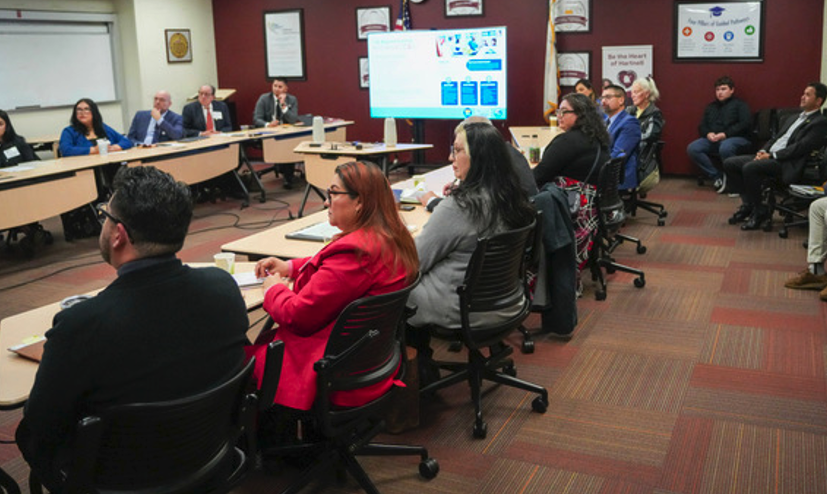As Congress and President Trump propose cutting more than $800 billion from Medicaid, millions of children will lose their health care coverage. The connection between health care and education is undeniable—when students are sick or without access to medical care, their academic performance and overall well-being suffer. With Medicaid cuts looming, we as educators must sound the alarm: Our students are at risk, and immediate action is necessary.
Additionally, nutrition assistance programs are under threat, putting our most vulnerable students and families at even greater risk. The connection between nutrition and education is undeniable—proper nutrition is crucial for a child’s physical and cognitive development, directly impacting their ability to learn and succeed in school. And these cuts are just the beginning. So, where do we go from here?
As educators, we must stay informed about national developments while taking local action to ensure that the resources we have the most influence over are being used effectively for all students and families.
How can we take action at the local level? It starts with engaging with school boards, city councils, state legislatures and Congress. Local action can have a powerful impact on our communities and schools. It creates a two-way dialogue—by listening to elected officials and understanding their perspectives, we also can educate them about the real challenges our students face, the successes achieved with proper support, and the positive outcomes that result from well-allocated resources and critical services. This collaborative effort can drive meaningful change in our education system.
In California, I had the privilege of participating in a significant legislative advocacy event organized by the California School Boards Association from March 11–13. This three-day virtual event connected school district and county office board members with state legislators and their staff to highlight pressing issues affecting schools across the state. In Monterey County, this event culminated in an impactful in-person Educational Roundtable at Hartnell College, where Assembly Speaker Robert Rivas and his staff joined local educational leaders to discuss the critical needs of our students and schools.
The roundtable featured educational teams from the cradle-to-career pathway in Monterey County, including Hartnell College board members Vice President Alejandra González and Candi DePauw, one of Hartnell's most experienced board members. These teams shared their experiences and provided detailed presentations on the challenges their communities face, particularly regarding equity and access to education.
The Alisal Union School District, which serves approximately 7,700 students in 12 K–6 schools (including preschool programs in Salinas, presented their experiences. The district’s demographics include 92% Latino students, 85% free/reduced lunch recipients and 75% English Learners. The district serves a community deeply rooted in agricultural work, with many farmworker and immigrant families whose children face additional challenges in accessing quality education.
Hartnell College, one of California's oldest higher education institutions, also shared its experiences. With approximately 17,000 students, the college provides pathways to both four-year universities and career technical fields, supporting a diverse student body. Their contributions underscored the importance of college access and workforce readiness.
Nonprofit organizations like EDMO—whose mission is to create pathways for lifelong success for kids, families and communities—and representatives from the Monterey County Office of Education discussed expanding learning opportunities to address achievement gaps. These efforts focus on increasing access to extended learning experiences that support the diverse needs of students in our community.
Each group presented evidence-based strategies, human impact stories and recommendations for improving services. The roundtable sparked productive dialogue and collaboration, helping to identify areas for improvement and innovation in the Monterey County cradle-to-career pathways program. The event concluded with a Q&A session that helped clarify key points and solidify the collective action required to move forward.
The event was attended by a wide range of stakeholders, including the Hartnell College president and vice president, educational specialists, district superintendents, principals, parent leaders and expanded learning teams. Together, we took meaningful steps toward finding solutions that address the unique challenges faced by students and families in Monterey County.
We must continue to act locally while thinking globally about the critical issues affecting our school communities. Leonard Covello, who led educational initiatives in some of New York City’s most promising and challenging boroughs, believed and fought with the conviction that “the battle for a better world will be won or lost in our classrooms and schools.”
-----------------------------------
Raymond R. Isola is an executive board member and treasurer of the United Administrators of San Francisco, Emeritus, AFSA Local 3E. A former school principal and bilingual teacher, Isola currently is an EDMO board member.
Photo Credit: Richard Morales, Director of Communications & Marketing at Hartnell College.
There were about 30 participants in the educational roundtable representing parents, school board members, principals, district administrators, superintendents and college presidents.

